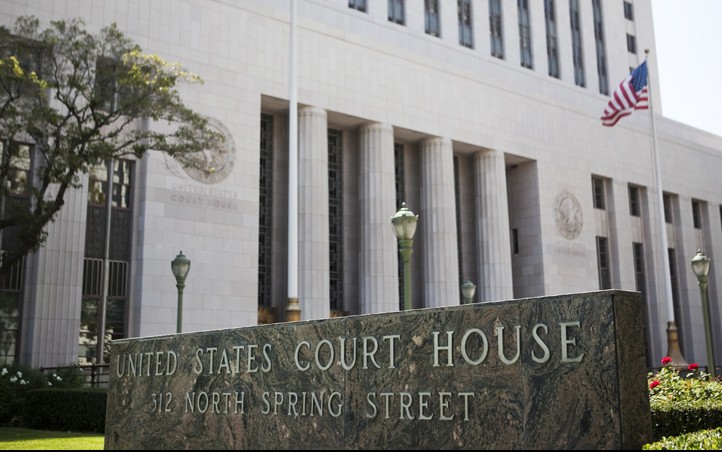LOS ANGELES
 Authorities have arrested five defendants – including several Southern California residents – for allegedly participating in a years-long scheme to steal millions of dollars from American consumers’ bank accounts, the Justice Department announced Wednesday.
Authorities have arrested five defendants – including several Southern California residents – for allegedly participating in a years-long scheme to steal millions of dollars from American consumers’ bank accounts, the Justice Department announced Wednesday.
The arrests follow a federal grand jury last week returning a seven-count indictment that charges a total of 14 defendants. They are charged with conspiracy to violate the Racketeer Influenced and Corrupt Organizations (RICO) Act.
According to the indictment, various members and associates of the alleged criminal enterprise created shell entities that claimed to offer products or services, such as cloud storage.
Then, after obtaining identifying and banking information for victims, the enterprise allegedly executed unauthorized debits against victims’ bank accounts, which it falsely represented to banks that the victims authorized.
 Because some of the unauthorized debits resulted in returned transactions – which generated high return rates and could raise red flags at financial institutions – the indictment alleges the enterprise’s shell entities also generated “micro debits” against other bank accounts controlled by the enterprise.
Because some of the unauthorized debits resulted in returned transactions – which generated high return rates and could raise red flags at financial institutions – the indictment alleges the enterprise’s shell entities also generated “micro debits” against other bank accounts controlled by the enterprise.
The micro debts allegedly artificially lowered shell entities’ return rates to levels that conspirators believed would reduce bank scrutiny and lessen the potential negative impact on the enterprise’s banking relations.
The five defendants arrested Tuesday are:
- Edward Courdy, 73, of Hawaiian Gardens
- Eric Bauer, 65, of Huntington Beach
- Veronica Crosswell, 35, of Long Beach
- Jenny Sullivan, 46, of Denver
- John Beebe, 52, of Honolulu
Defendant Linden Fellerman, 67, of Las Vegas, has agreed to surrender himself on Friday to authorities in Los Angeles.
Three other defendants have been summonsed to appear in United States District Court in Los Angeles on May 24. Those defendants are:
- Michael Young, 41, of Hollywood, Florida
- Randy Grabeel, 71, of Pittsburg, California
- Debra Vogel, 68, of Las Vegas
Seven other defendants are currently fugitives being sought by federal authorities.
They are:
- Guy Benoit, 68, a resident of Canada and Cyprus
- Steven Kennedy, 54, of Canada
- Sayyid Quadri of Canada
- Ahmad Shoaib, 63, of Canada
- Lance Johnson, 52, of Laveen, Arizona
In addition to the RICO offense alleged in the indictment, all of the defendants – except Grabeel and Vogel – are charged with at least one count of wire fraud.
Harold Sobel was previously convicted for his role in the scheme in Las Vegas federal court and sentenced to 3½ years in prison.
In a related civil case also filed in Los Angeles federal court, injunctive relief and settlements totaling nearly $5 million were obtained against various persons, including several charged in this criminal indictment.
“This sophisticated scheme allegedly generated millions of dollars in revenue by using consumers’ personal information to fraudulently reach straight into the bank accounts of thousands of Americans,” said United States Attorney Martin Estrada. “The indictment alleges that an international network of fraudsters engaged in a wide-ranging scheme which sought to victimize consumers while concealing their activities from banks and law enforcement authorities. Thanks to law enforcement, the defendants’ alleged efforts to continue this scheme have failed.”
“The scheme alleged in the indictment involved an elaborate plot to reach into consumers’ bank accounts and steal their hard-earned savings,” said Principal Deputy Assistant Attorney General Brian M. Boynton, head of the Justice Department’s Civil Division.
All defendants are presumed innocent unless proven guilty.
Some defendants made their initial court appearances yesterday.
If convicted, each defendant faces a maximum penalty of 20 years for racketeering conspiracy and, if applicable, 30 years for each count of wire fraud.
The U.S. Postal Inspection Service is investigating the case.
Assistant United States Attorney Monica Tait of the Major Frauds Section and Trial Attorneys Wei Xiang, Meredith Healy, and Amy Kaplan of the Justice Department’s Consumer Protection Branch are prosecuting the case.
Report any fraudulent debit you identify to law enforcement. Reports may be filed with the FTC at www.ftccomplaintassistant.gov or at 877-FTC-HELP.

